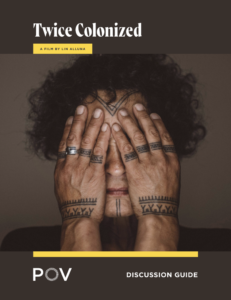
After Sherman Discussion Guide
At a glance
Introduction
This guide is an invitation to dialogue. It is based on a belief in the power of human connection and designed for people who want to use After Sherman to engage family, friends, classmates, colleagues, and communities. In contrast to initiatives that foster debates in which participants try to convince others that they are right, this document envisions conversations undertaken in a spirit of openness in which people try to understand one another and expand their thinking by sharing viewpoints and listening actively.
The discussion prompts are intentionally crafted to help a wide range of audiences think more deeply about the issues in the film. Rather than attempting to address them all, choose one or two that best meet your needs and interests. And be sure to leave time to consider taking action. Planning next steps can help people leave the room feeling energized and optimistic, even in instances when conversations have been difficult.
For more detailed event planning and facilitation tips, visit https://communitynetwork.amdoc.org/.
Credits & Acknowledgments
Michelle Lanier is a renowned public historian, folklorist,
keeper of memory, educator, filmmaker, and multi-genre
author, rooted in AfroCarolina and inspired by the Global
South. An experimental geographer, Lanier believes in the transformative power of land as witness. Michelle has
served on the faculty of the Center for Documentary Studies (CDS) at Duke University since 2000. Her teaching led to work as a Documentary Doula (aiding the birth of films) most notably the award-winning Mossville: When Great Trees Fall, which she also executive produced. Mossville reveals a global south story of resistance to environmental racism and has been translated into five languages, screened on five continents, and chosen by the United Nations in an effort to raise awareness about the impacts of the climate
crisis on the lives of people of African descent. As a proudly unionized adjunct fellow, at CDS, Michelle’s pedagogy centers the ethics of ethnographic deference, reciprocity, and vulnerability. Through her current work as a doctoral student at the University of North Carolina-Chapel Hill’s Department of Geography, Michelle is deepening her praxis of Black feminist and womanist cartographies through embodiment and the poetics of Black South commemoration.
 Hummingbirds Discussion Guide (Spanish)
Hummingbirds Discussion Guide (Spanish)  Twice Colonized Discussion Guide
Twice Colonized Discussion Guide  Accepted
Accepted  Let the Little Light Shine
Let the Little Light Shine